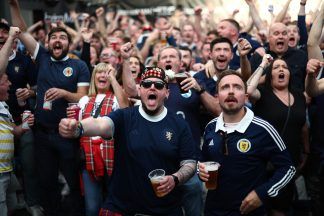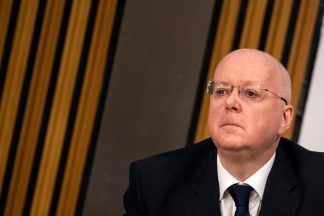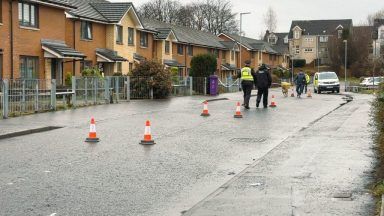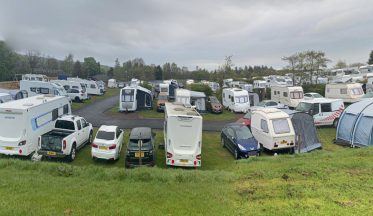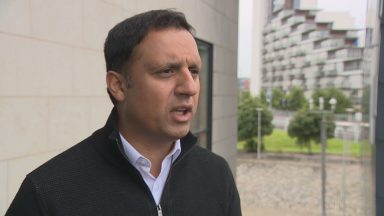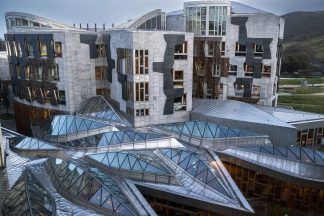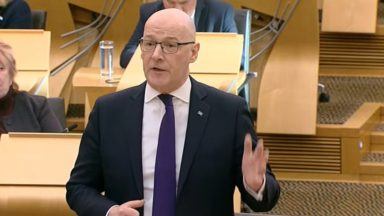Voters across the UK will head to the polls this summer after Rishi Sunak confirmed the general election will be held on July 4.
The Prime Minister delivered the shock news in a speech outside Downing Street during the pouring rain and the sound of New Labour anthem Things Can Only Get Better being blared by a member of the public.
The Conservative leader pledged to “fight for every vote” as he attempts to overturn a 20-point deficit in the opinion polls.
He pitched himself as a reliable leader who would get Britain through uncertain times and accused Labour leader Keir Starmer of lacking a plan for the UK.
Watch
UK general election date confirmed
Scotland’s First Minister welcomed the news of the election and said it would be an opportunity to “remove” a “discredited Conservative Government”.
But John Swinney criticised the timing of the vote, accusing Downing Street of “contempt” for the Scottish people.
July 4 will coincide with the school holidays for most of Scotland meaning many families could be abroad during the ballot.
It also occurs at the same time as the Euros which are set to begin on June 14 and will finish exactly one month later.
Swinney said he was “delighted” to take the SNP into a general election, having been appointed leader earlier this month.
“This is the moment to remove the Tory Govt and put Scotland First by voting SNP,” he said.
“People in Scotland know we stand up for them and protect them from the damage done by Westminster.”
Watch
Scottish political leaders react to general election news
During his speech outside Number 10 on Wednesday evening, Sunak said he was proud of what the Conservatives have achieved in Government since 2010.
Sunak’s announcement came after the Office for National Statistics said Consumer Prices Index (CPI) inflation slowed to 2.3% in April, down from 3.2% in March.
He said that inflation was now “back to normal”, meaning “the pressure on prices will ease and mortgage rates will come down” – although interest rates are actually a matter for the independent Bank of England.
It was “proof that the plan and priorities I set out are working”, Sunak said, but he acknowledged “for some it might still be hard when you look at your bank balance”.
Sunak said he had restored “hard-earned, economic stability”.
“The question now is how and who do you trust to turn that foundation into a secure future for you, your family and our country.”
He added: “On July 5, either Sir Keir Starmer or I will be prime minister. He has shown time and time again that he will take the easy way out and do anything to get power.
“If he was happy to abandon all the promises he made to become Labour leader once he got the job, how can you know that he won’t do exactly the same thing if he were to become prime minister?
“If you don’t have the conviction, to stick to anything you say, if you don’t have the courage to tell people what you want to do and if you don’t have a plan, how can you possibly be trusted to lead our country, especially at this most uncertain of times?”
The leader of the Scottish Tories said his party is ready to “take the fight to the SNP” and beat them in “key seats up and down Scotland”.

“This election in Scotland is a huge opportunity to defeat the SNP and put an end to their obsession with independence for good,” said Douglas Ross.
Labour leader Keir Starmer said a vote for his party would be a vote for stability.
He said the election as a moment for “change” in the UK after 14 hours years Tory government.
“Over the course of the last four years, we have changed the Labour Party, returned it once more to the service of working people,” he said.
“All we ask now, humbly, is to do exactly the same for our country and return Britain to the service of working people.”
Labour begins the campaign in a strong position, with a 20-point lead over the Conservatives, but with a stiff challenge after suffering its worst defeat in decades in 2019.
Boundary changes have added to that challenge, with Labour needing a bigger swing than Tony Blair achieved in 1997 if the party is to win a majority.
Polling suggests that a resurgent Labour could take dozens of seats from the SNP in Scotland in what could be the biggest shake-up since the SNP’s landslide victory in 2015.
Follow STV News on WhatsApp
Scan the QR code on your mobile device for all the latest news from around the country






